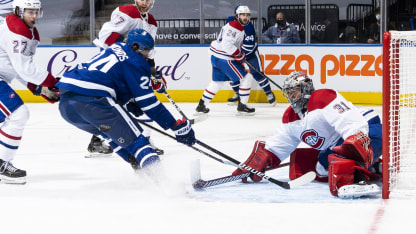Devan Dubnyk became the best example of the benefits of having three goalies on the roster to avoid fatigue when he played a started 38 consecutive games, a Minnesota Wild record, after being acquired in a trade from the Arizona Coyotes during the 2014-15 season.
At the time the Wild were carrying two other goalies, Niklas Backstrom and Darcy Kuemper. That allowed Dubnyk to get on the ice before practices to do position-specific drills with the goaltending coach to stay on top of his technical game. He often would skip practice, leaving that to Backstrom and Kuemper.
"Guys need to work on skills and high-percentage plays, and that's fine, but when they're undefended and not giving you a chance to actually read off a play that would normally happen in front of you, sometimes you can build bad habits, especially when you're just hammering reps out over and over and over," said Dubnyk, who was traded by the Wild to the San Jose Sharks on Oct. 5. "It's hard on the body, let's be honest, and guys shoot the puck hard now. So you can avoid bumps and bruises from practice shots that aren't really necessary if you're playing every other day.
"I was able to use that time [before practices] to kind of sharpen up, make sure I stayed on top of what I needed to do."
A few NHL teams followed that path in ensuing seasons.
The Carolina Hurricanes have used equipment manager Jorge Alves, who played at the minor pro level from 2004-07, to give their regular goalies a break. The Vancouver Canucks inserted assistant athletic trainer Dave Zarn as a practice goalie at times.
Other teams have brought in local college goalies for short periods to give their regular goalies time off from practice or to allow them to spend extra time working with the goaltending coach.
The concept never gained full traction across the NHL for a number of reasons.
In the past it was hard for many teams to justify having a prospect or experienced pro spending that much time practicing without the chance to play games, and few teams wanted to spend an NHL salary on a practice goalie. Also, shooters want to face NHL-caliber goalies during practice. So the amateur goalie route was a stopgap measure at best.
None of that will be an issue this season because of the presence of a taxi squad goalie. It could mark a turning point, especially with time to rest and reset technique so valuable in a schedule that will have very few extended breaks.
"From a goalie standpoint the idea has been talked about forever, and for the first time you'll get to play with that model a little," Edmonton Oilers goaltending coach Dustin Schwartz said.
During the Stanley Cup Playoffs, teams call up extra players from the American Hockey League to fill out practices and give regulars extra rest. Schwartz and others said they believe the taxi squad can serve a similar purpose for goalies throughout this season.
"You'll have a lot more options this season, and the ability to be a little bit creative for rest, not only physically but mentally," Schwartz said. "That's where this can be a real benefit and a good trial or a test run."
Oilers coach Dave Tippett already is a convert.
"That third guy will come in handy," he said. "For years I thought teams should be able to carry three goalies because you need him for a practice now and then. Now you have it. It'll be a nice luxury."

